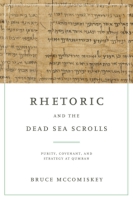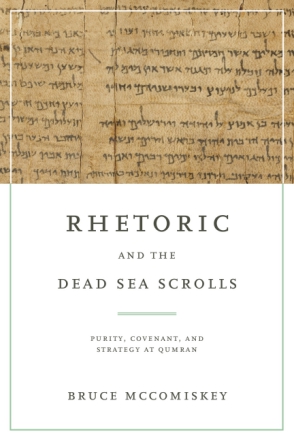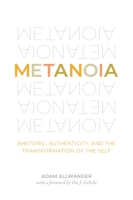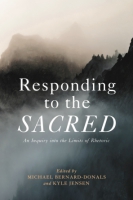Rhetoric and the Dead Sea Scrolls
Purity, Covenant, and Strategy at Qumran
Bruce McComiskey
“This is an intriguing study by a non-specialist in the field that will be profitable for students of the Scrolls interested in the role of rhetoric.”
- Description
- Reviews
- Bio
- Table of Contents
- Sample Chapters
- Subjects
Applying methods of rhetorical analysis to six substantive texts—Miqṣat Maʿaśeh ha-Torah, Rule of the Community, Damascus Document, Purification Rules, Temple Scroll, and Habakkuk Pesher—Bruce McComiskey traces the Essenes’ use of rhetorical strategies based on identification, dissociation, entitlement, and interpretation. Through his analysis, McComiskey uncovers a unique, fascinating story of an ancient religious community that had sought to reintegrate into Temple life but, dejected, instead established itself as the new covenant people of God for this world, only to turn ultimately to a trust in a metaphysical afterlife.
Presenting forms of ancient Jewish rhetoric largely uninfluenced by classical rhetoric, this book broadens our understanding of human and religious rhetorical practice, even as it provides new insight into the events that led to the emergence of the Talmudic period. Rhetoric and the Dead Sea Scrolls will be useful to scholars working in the fields of religious rhetoric, Jewish studies, and early Christianity.
“This is an intriguing study by a non-specialist in the field that will be profitable for students of the Scrolls interested in the role of rhetoric.”
“Religious historians looking for examples of rhetorical case studies on ancient Jewish texts and rhetoricians looking for an introduction to the Dead Sea Scrolls will find this a valuable book.”
“Bruce McComiskey is the first in rhetorical studies to conduct a systematic reading of seven Dead Sea Scrolls manuscripts, examining how identification, distinction, persuasion, performative strategies, dissociation, and ideas about material rhetorics are present and enacted through these manuscripts. In doing so, he makes an important case for the rhetorical significance of the Dead Sea Scrolls as well as the methodological utility of a hermeneutics/rhetoric approach for reading these texts.”
Bruce McComiskey is Professor of English and Director of Professional Writing at the University of Alabama at Birmingham. He is the author of Teaching Composition as a Social Process; Gorgias and the New Sophistic Rhetoric; Dialectical Rhetoric; and Post-Truth Rhetoric and Composition.
Acknowledgements
Introduction
1. Rhetorics of Identification, Distinction, and Persuasion in Miqsat Maʿaśeh ha-Torah
2. Performative Rhetorical Strategies in the Rule of the Community
3. Dissociation as a Rhetorical Strategy in the Damascus Document
4. Impurity and Purification as Material Rhetoric in the Purification Rules (4QTohorot A and B) and the Temple Scroll (11QT)
5. Hermeneutics/Rhetoric in the Book of Habakkuk and the Habakkuk Pesher (1QpHab)
Conclusion
Notes
Bibliography
Resources for the Study of the Dead
Sea Scrolls
Index
Also of Interest
Mailing List
Subscribe to our mailing list and be notified about new titles, journals and catalogs.






